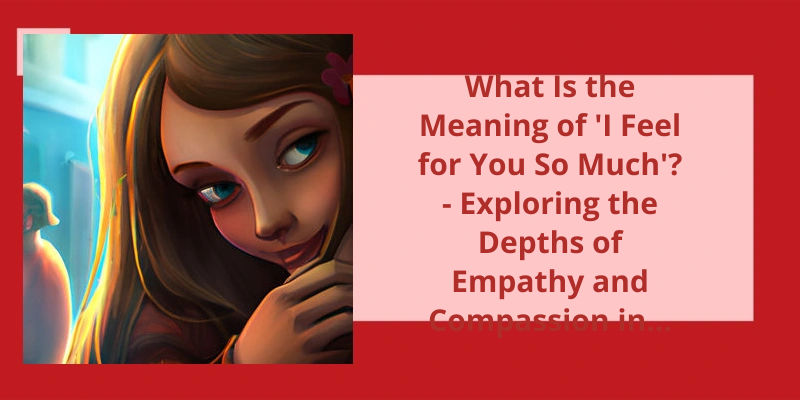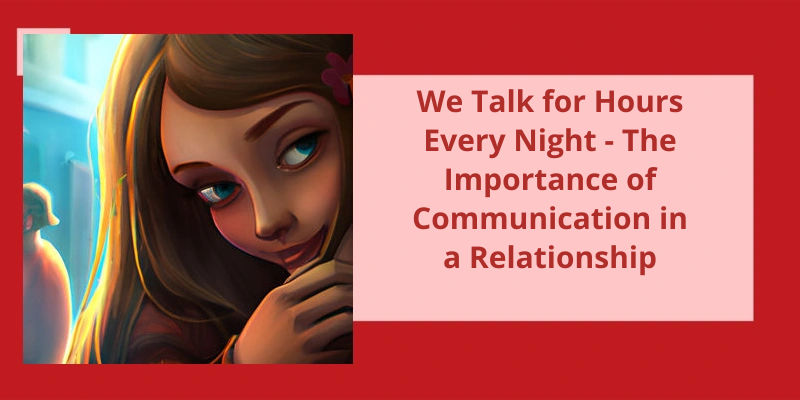Human emotions are complex and nuanced. They can be difficult to express accurately, yet they can profoundly impact our relationships with others. One phrase that captures a range of emotions is "I feel for you." This phrase can convey sympathy, empathy, and concern for another person's well-being. It expresses a willingness to step into someone else's shoes and share their sorrow or pain. However, the phrase can also be used in a different context, where "I feel you" is used as slang to convey agreement or understanding. Whether through empathy or agreement, these phrases hold deep emotional significance for those engaged in meaningful conversations and connections.
What Does Feel for Someone Mean?
(feel for someone) to have strong romantic feelings for someone. I think Im starting to develop a feel for him. Synonyms and related words. To be in love or fall in love.
(feel for someone) to understand someones situation and emotions. I can really feel for my friend who’s going through a tough time. To understand someones feelings.
I’ve a great feel for my colleagues work ethic. To like or admire someone.
(feel for someone) to have a sense of familiarity or connection with someone. I’ve a feel for my hometown, even though I havent lived there in years. To have a sense of connection.
The phrase “feel for someone” is a versatile expression that can take on various meanings depending on the context. The most common meaning is to feel sympathy for someone who’s going through a difficult situation or hardship. This could include someone who’s dealing with a loss, illness, or mental health issue. When we feel for someone, we’re acknowledging their pain and showing them that we care.
This could be a sign that someone is falling in love with another person and is developing strong emotions towards them. These feelings can be intense and can often manifest as butterflies in the stomach or a sense of euphoria.
In this context, we’re able to empathize with someone and put ourselves in their shoes. This is a valuable skill in building connections and fostering relationships because it allows us to relate to others on a deeper level.
This could apply to a colleagues work ethic or a friends personality traits. When we’ve a feel for someone, we respect and appreciate the qualities they possess and enjoy being around them.
This could be applied to a hometown, a culture, or even a person we’ve just met. When we’ve a feel for something, it means that we understand it on a deep level and it resonates with us in some way. In the case of a person, it could mean feeling drawn to their energy or vibe.
When it comes to expressing empathy or understanding towards someone, saying “I feel you” has become a common phrase in modern language. However, some people may perceive it as informal or amateurish. As communication evolves, it’s essential to consider alternative phrases that convey the same sentiment but may sound more appropriate in various situations. Let’s explore some options.
What Can I Say Instead of I Feel You?
The phrase “I feel you” has become a common slang expression in recent years, often used to indicate empathy or understanding. However, many people find it to be an overly casual or even crass way of expressing empathy, and prefer to use other phrases instead. One alternative might be to simply say “I understand how you feel,” which is a more straightforward and formal way of conveying empathy.
Another possible response to someone expressing their feelings might be to say “That must be difficult for you,” which acknowledges their emotions and shows that you’re willing to listen and support them. Alternatively, you might say something like “Im here for you,” which conveys that you’re ready and willing to help in any way you can.
Of course, it’s important to remember that everyone responds differently to emotional situations, and there’s no one-size-fits-all approach to expressing empathy. Some people may prefer direct sympathy, while others might appreciate a more lighthearted or humor-based response. As such, it’s always a good idea to take your cues from the person you’re speaking with, and to be open to their feedback and preferences.
Ultimately, the most important thing when expressing empathy is to be genuine and sincere. Whether you choose to say “I feel for you,” “I understand,” or something else entirely, the key is to convey that you’re listening and that you care about the other persons well-being. By approaching each conversation with empathy and an open mind, you can build stronger connections and better relationships with the people around you.
Cultural Differences in Expressing Empathy and Emotions
Cultural differences can impact the ways people express empathy and emotions. These differences can be seen in verbal and nonverbal communication. It’s important to be aware of these variations in order to communicate effectively and respectfully across cultures.
Empathy and compassion are some of the most important traits that make us human. When we feel for someone, we’re able to connect with them on a deeper level, understanding their pain and offering them comfort and support. It’s a powerful experience that can bring people closer together and create a bond that lasts a lifetime. In this article, we will explore what it means to feel so much for someone and why it’s such a crucial part of our emotional wellbeing.
What Does Feel So Much for Someone Mean?
Empathy, the capacity to understand and share the feelings of another, is an integral part of human nature. Feeling for someone goes beyond just recognizing that they’re suffering, it involves an emotional connection and a willingness to try to understand their pain. It means putting oneself in their shoes and experiencing their struggles as if they were your own. True empathy is a powerful force that can bridge gaps and build deep and meaningful connections between people.
Feeling for someone isn’t just limited to the people we know intimately, it extends to those around us who’re essentially strangers. It can be a call to action, inspiring us to help those in need and make a positive impact on the world. However, feeling for someone can also be a burden. Compassion fatigue is a real phenomenon, where the constant exposure to other peoples pain and suffering can lead to emotional exhaustion and a loss of empathy. It’s important to take care of oneself and find healthy ways to process and manage these emotions.
Feeling for someone isn’t always a pleasant experience. It can be painful and overwhelming, causing us to feel helpless and despairing. Nonetheless, it’s a necessary part of the human experience. The ability to feel deeply for others is what sets us apart from other animals and makes us capable of great acts of kindness and love. Being vulnerable to the suffering of others requires courage and strength, and it’s a sign of emotional maturity and intelligence.
Feeling for someone means experiencing the full range of emotions that another person is going through. It involves a deep connection that goes beyond just recognizing that they’re suffering. Overall, feeling for someone is what makes us human, and it’s what allows us to connect and show compassion to those around us.
The Connection Between Empathy and Emotional Intelligence
Empathy and emotional intelligence are interconnected because emotional intelligence involves being aware of and understanding one’s emotions as well as the emotions of others. Empathy, on the other hand, is the ability to perceive and understand the feelings and emotions of others. Therefore, having higher emotional intelligence means having a greater capacity for empathy and the ability to connect with others on an emotional level.
Source: Meaning of feel for someone in English – Cambridge Dictionary
However, when it comes to expressing how you feel about someone, it can be a bit trickier. It’s not uncommon to feel a mix of emotions towards someone, whether it’s love, admiration, or even frustration. But no matter what you’re feeling, it’s important to be honest with yourself and with them about your emotions.
How I Feel About You or for You?
However, when I think about how I feel about you, it’s a whole different story. I cant help but feel a warmth in my heart whenever Im around you. It’s like being in a warm, cozy blanket on a cold winter day. I feel safe and cared for whenever Im with you, and I cant imagine life without you.
The truth is, Im in love with you. I know it’s a bold statement, but it’s how I truly feel. I’ve never felt this way about anyone before, and it’s both exhilarating and terrifying at the same time. I cant help but smile whenever I think of you, and my heart flutters whenever I see you.
Sometimes I wonder if you feel the same way about me. Whenever we talk, I catch a glint in your eye that suggests there may be something more there. Or is it just my wishful thinking? I don’t know. All I know is that I want to be with you, to share my life with you, and to make you happy.
I don’t know what the future holds for us, but I know how I feel about you. And that feeling is real and true. You inspire me to be a better person, to be kinder, and more patient. You bring out the best in me, and for that, Im eternally grateful.
So, in conclusion, I want you to know that I love you. Not just in a casual, platonic way, but in a deep, meaningful way that transcends words and actions. You’re the most important person in my life, and I’ll do everything in my power to make you happy and to show you how much you mean to me. Thank you for being you.
Conclusion
In conclusion, language is an ever-evolving and complex form of communication. Whether we use one or the other, it’s important to consider the context and intention behind our words, in order to effectively communicate with one another and bridge the gaps that exist between us. Let’s continue to strive for greater empathy and understanding in all our interactions, and find common ground to connect with one another on a deeper level.






